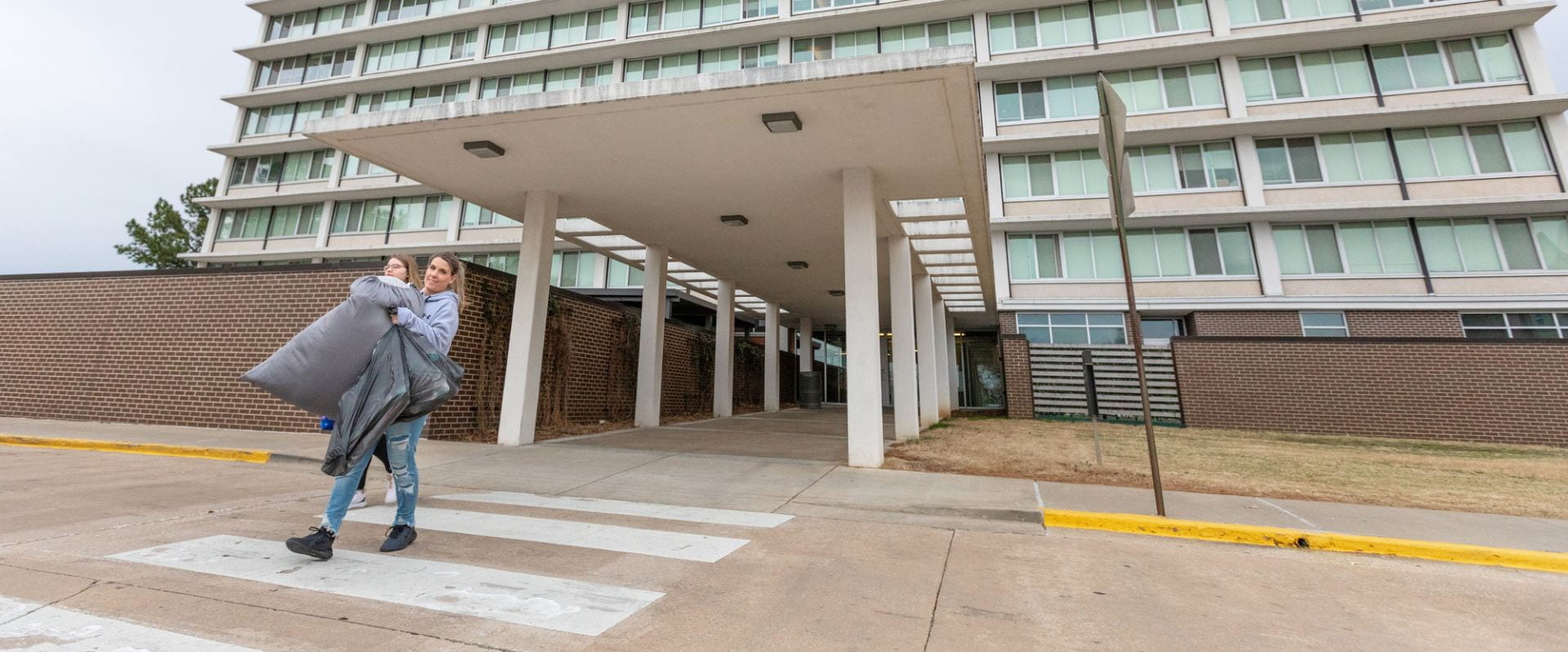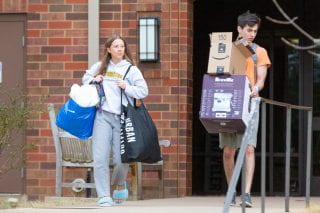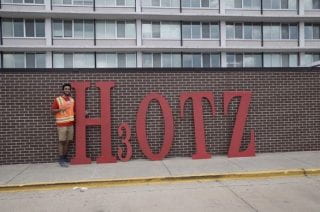
Less Than 200 Students Stayed Till May
Divya Singh was napping in his room in Hotz Honors Hall when the first email arrived. It was jarring, but not unexpected.
That March 12 email from Chancellor Joseph Steinmetz announced classes would move online due to the COVID-19 pandemic. It ignited a flurry of GroupMe and text messages among the resident assistants, or RAs, across campus, unsure what this meant for their residents.
“We sort of suspected the announcement was coming. Professors had been discussing what it would be like to move online in class before the email,” Singh said.
Singh is a junior computer science major with minors in mathematics and supply chain management. He is part of the Honors College and is in his second year as an RA on campus.
March 18, the chancellor announced that residence halls were closing to students April 3, a full month earlier than expected. And with that email, the most unusual University of Arkansas move-out in living memory began.
Singh said it took a while for the reality of it to set in at Hotz Honors Hall. Checkouts were sporadic until after spring break. Then the number started growing and peaked April 3.
On the first floor of Hotz Honors Hall is an open glass seating area called “the fishbowl” with a large white board. On that white board, residents kept a list of those who moved out.
It became a kind of bulletin board and memorial, Singh said.
Accommodating Students
 “It was the slowest move-out I’ve ever experienced,” said Takama Statton-Brooks, director of University Housing’s residence education unit.
“It was the slowest move-out I’ve ever experienced,” said Takama Statton-Brooks, director of University Housing’s residence education unit.
Move-out is usually a matter of a few days, but this year, it stretched over weeks as students opted to leave when it was most convenient for them.
Between March 1 and March 30, the residential population dropped from 5,050 to 1,446. By April 3, when the residence halls officially closed, the on-campus population was down to 640 students.
Residence education staff play a leading role in checking out students before they leave. During a typical move-out, staff enter the rooms to inspect for damage and receive room keys.
During this unprecedented move-out, students only turned in their keys before leaving and did their best to remove their personal items and clean their room.
Some students left before returning their keys.
Housing received as many as 20 sets of keys in the mail some days during move-out as students who already left mailed their keys back to complete check out.
Many students went home for spring break in late March and were caught under a patchwork of different “stay-at-home”order” on a state-by-state basis.
“Students were communicating with us all across the country about where they were and what their situation was,” said Alisha Gilbride, Housing’s assistant director for administrative service.
Housing staff remained as flexible as possible with students as move-out progressed from mid-March to early April.
Ultimately, two groups remained behind after the April 3 deadline.
Those Who Remained
The two groups of students who remained on campus on campus after April 3 include those who needed a delayed check out and those who needed an extended stay.
Less than 200 students needed more time to retrieve their items from their room. Often, they were not physically on campus, but their belongings were. Housing staff arranged for those students to come and get their items at a convenient time.
Another 175 or so students asked to remain for various reasons such as not having suitable alternative accommodations or inadequate access to academic resources online at their home.
 Singh, an RA in Hotz Hall, is a citizen of India. He, like many other international students had a tough choice to make – fly home during an uncertain time or stay on campus.
Singh, an RA in Hotz Hall, is a citizen of India. He, like many other international students had a tough choice to make – fly home during an uncertain time or stay on campus.
Singh talked with his parents in India and his brother in Chicago and they decided it was best if he remained on campus until the halls closed in May.
“I felt safer here,” he said about remaining in Hotz Honors Hall after the April 3 move-out for the majority of students.
Those permitted to stay past April 3 were also allowed to remain in their original room assignment.
To accommodate the smaller population and help with social distancing, Housing teamed up with Chartwells Higher Ed and Parking and Transit.
Chartwells Higher Ed provides meals on campus and they offered hot meal options that could be taken to go for those still on campus.
Parking and Transit offered their safe ride service on campus to and from Fulbright Dining Hall where meals were served.
“It was a really good partnership that served the students well,” said Statton-Brooks about working with Chartwells and Parking and Transit.
New Strategies
 Housing also got creative in its programming during this time. They offered “socially distanced jogging,” a Bob Ross online paint class using Microsoft Paint, a Skribbl.io meeting and other types of safe programs for on-campus students.
Housing also got creative in its programming during this time. They offered “socially distanced jogging,” a Bob Ross online paint class using Microsoft Paint, a Skribbl.io meeting and other types of safe programs for on-campus students.
The various residence halls’ social media accounts featured RAs showing off their talents or hobbies in an effort to keep students engaged virtually.
“We really changed the core of the RAs jobs,” said Megan Witherspoon-Evans, University Housing’s assistant director for residence education.
Instead of in-person meetings with residents, RAs used digital platforms to keep up with students through online meetups. They transitioned many analog processes of community building into digital versions.
The RAs who remained are really going to lead us next year in terms of digital programming,” Witherspoon-Evans said.
Singh served the remaining residents of his building during the final weeks before the halls closed fully in May. He was one of about 30 RAs who stayed behind in the final weeks.
He said Housing did a good job of supporting students and staff by providing meals and expanded work hours to ensure front desks were adequately staffed.
“Personally, it was one of the best experiences, I’ve had with Housing.”

